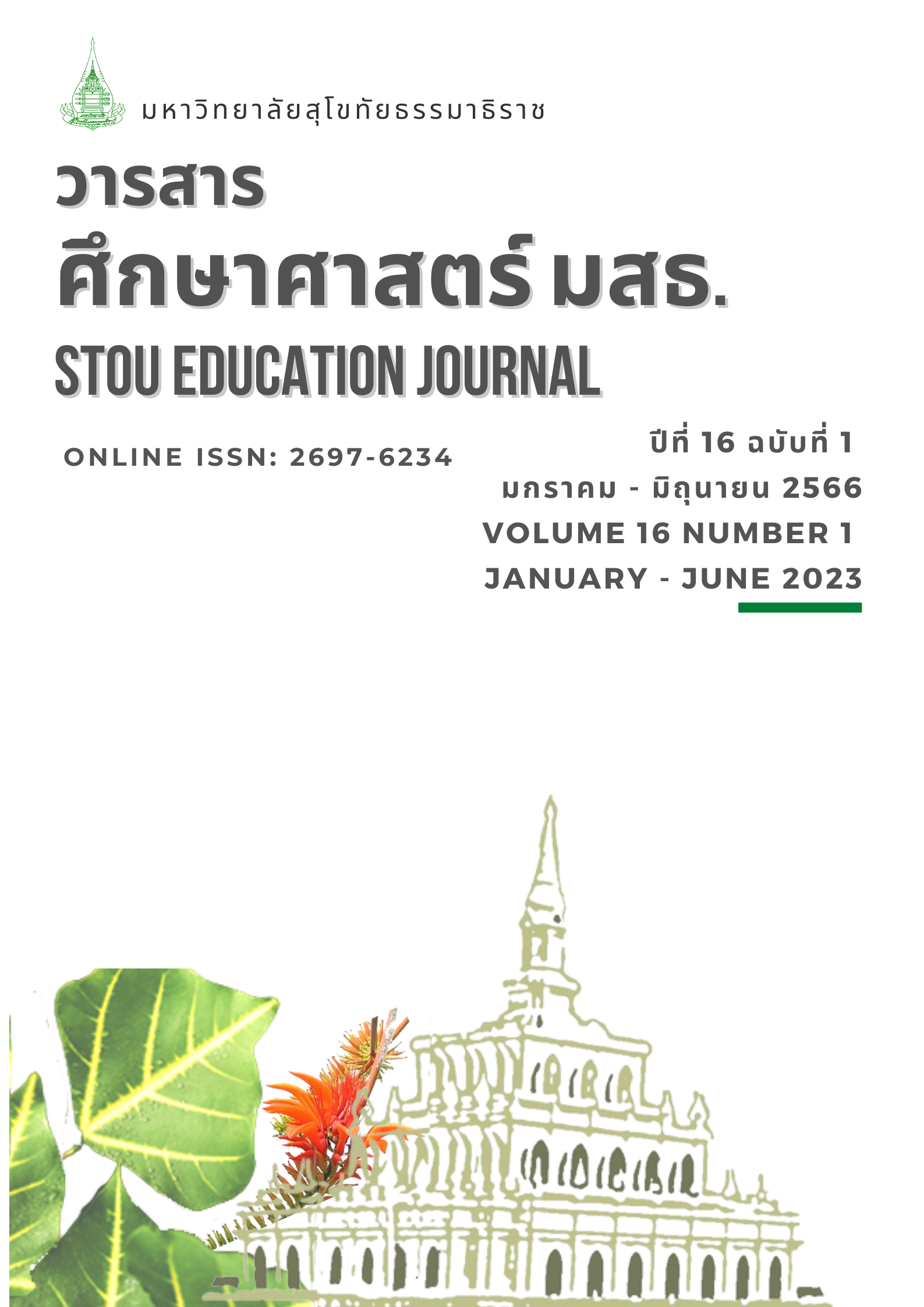Counting One to Overcome Fear: Exploring Science Teachers’ Fear of Failure in Competency-Based Instruction
Main Article Content
Abstract
Fluctuating changes in today's world have made educational goals focused on developing the competencies required in real life and nurturing learners according to their potential. The challenge is that teachers need to change their perspectives, beliefs and practices from traditional teaching to organizing active activities to promote the competencies of the learners. This survey research aimed to investigate the fear of failure (FF) of science teachers in competency-based instruction (CBI). The research sample consisted of 55 science teachers at the secondary education level in Samut Songkhram province obtained by simple random sampling. The instrument used in the study was a questionnaire on “Fear of Failure in Competency-Based Instruction for Science Teachers” consisting of closed-ended items using Likert’s scale (Cronbach's alpha reliability coefficient = 0.90) and open-ended items. The findings indicated that science teachers had the moderate level of fear of failure in terms of emotion or feelings in the competency-based instruction. The teachers viewed that the learner was an important context for success or failure of competency-based learning instruction. Teachers had the moderate level of fear of failure in terms of specific personal characteristics. Most of them were optimistic in their world view, dared to confront the problems and had readiness for managing competency-based learning. Yet, some teachers acknowledged their failure in managing competency-based learning. This group of researchers suggested that in conducting research studies in the future, the researchers and educators should study guidelines to motivate, or enhance science teacher for reducing FF in CBI through the process of teacher professional development. By so doing, it is expected that the teachers would increase their understanding of CBI and be able to utilize it in the classroom more efficiently.
Article Details
References
คณะกรรมการอิสระเพื่อการปฏิรูปการศึกษาและสำนักงานเลขาธิการสภาการศึกษา. (2562). เอกสารประกอบลำดับที่ 4 โครงการวิจัยและพัฒนากรอบสมรรถนะผู้เรียนระดับประถมศึกษาตอนต้น สำหรับหลักสูตรการศึกษาขั้นพื้นฐาน. เอกสารสำเนา
กระทรวงศึกษาธิการ. (2546). พระราชบัญญัติการศึกษาแห่งชาติ พ.ศ.2542 และที่แก้ไขเพิ่มเติม (ฉบับที่ 2) พ.ศ. 2545. กระทรวงศึกษาธิการ.
ชาตรี ฝ่ายคำตา, ธาฤชร ประสพลาภ, อนุพงศ์ ไพรศรี, เขมวดี พงศานนท์, นิอร ภูรัตน์, และ กุลธิดา สะอาด. (2566). การพัฒนาชุมชนการเรียนรู้วิชาชีพที่ส่งเสริมสมรรถนะของครูวิทยาศาสตร์ในการจัดการเรียนรู้ในเนื้อหาเฉพาะที่เน้นการคิดขั้นสูง. วารสารวิทยาศาสตร์และวิทยาศาสตร์ศึกษา, 6(1), 36-73.
ภัสราภรณ์ สหะกิจ. (2564). ทรรศนะเกี่ยวกับทิศทางการจัดการเรียนรู้วิทยาศาสตร์ในหลักสูตรฐานสมรรถนะของประเทศไทย. วารสารชุมชนแห่งการเรียนรู้วิชาชีพครู, 1(2), 112-137.
สำนักงานคณะกรรมการการศึกษาขั้นพื้นฐาน (สพฐ.). (2565). กรอบหลักสูตรการศึกษาขั้นพื้นฐานระดับประถมศึกษา (ร่าง). https://cbethailand.com
สำนักงานเลขาธิการสภาการศึกษา. (2562). เข้าใจสมรรถนะอย่างง่าย ๆ ฉบับประชาชน และเข้าใจหลักสูตรฐานสมรรถนะอย่างง่าย ๆ ฉบับครู ผู้บริหาร และบุคลากรทางการศึกษา. http://backoffice.onec.go.th/uploads/Book/1661-file.pdf
Australian Curriculum, Assessment and Reporting Authority [ACARA]. (2014). Foundation to year 10 curriculum: Language for interaction (ACELA1428). https://www.australiancurriculum.edu.au
Annetta, L., Keaton, W., Shaprio, M., & Burch, J. (2018). Competency-based education in science teacher education: The next disruptive innovation or the next disruption. In M. Shelley & S. A. Kiray (Eds.), Education Research Highlights in Mathematics, Science and Technology 2018 (pp 123-140). ISRES Publishing.
Christian, K.B., Kelly, A.M., & Bugallo, M.F. (2021). NGSS-based teacher professional development to implement engineering practices in STEM instruction. International Journal of STEM Education, 8(21), 1-18.
Ford, R., & Meyer, R. (2015). Competency-based education 101. Procedia Manufacturing, 3, 1473-1480.
Gervais, J. (2016). The operational definition of competency-based education. The Journal of Competency-Based Education, 1(2), 98-106.
Henry, M. A., Shorter, S., Charkoudian, L. K., Heemstra, J. M., Le, B., & Corwin, L. A. (2021). Quantifying fear of failure in STEM: modifying and evaluating the Performance Failure Appraisal Inventory (PFAI) for use with STEM undergraduates. International Journal of STEM Education, 8(1), 1-28.
Kang, E. J. S., McCarthy, M. J., & Donovan, C. (2019). Elementary teachers’ enactment of the NGSS science and engineering practices. Journal of Science Teacher Education, 30(7), 788–814.
Lane, R., McMaster, H., Adnum, J., & Cavanagh, M. (2014). Quality reflective practice in teacher education: A journey towards shared understanding. Reflective Practice, 15(4), 481-494.
Likert, R. (1961). New Patterns of management. McGraw-Hill Book Company.
Lutovac, S. (2020). How failure shapes teacher identities: Pre-service elementary school and mathematics teachers’ narrated possible selves. Teaching and Teacher education, 94, 103120.
Lutovac, S., & Flores, M. (2021). ‘Those who fail should not be teachers’: Pre-service Teachers’ Understandings of Failure and Teacher Identity Development. Journal of Education for Teaching, 47(3), 379-394.
Martin, A.J. (2012). Fear of Failure in Learning. In: Seel, N.M. (eds) Encyclopedia of the Sciences of Learning. Springer, Boston, MA. https://doi.org/10.1007/978-1-4419-1428-6_266
Martin, A. J., & Marsh, H. W. (2003). Fear of failure: Friend or foe?. Australian Psychologist, 38(1), 31-38.
OECD. (2018). The Future of Education and Skills: Education 2030. Position paper,https://www.oecd.org/education/2030/E2030%20Position%20Paper%20(05.04.2018).pdf
O’sullivan, N., & Burce, A. (2014, September). Teaching and learning in competency-based education. In The Fifth International Conference on e-Learning (eLearning-2014) (pp. 22-23).
Patrick, S., & Sturgis, C. (2013). necessary for success: Building mastery of world-class Skills—A state policymakers guide to competency education. Competency works issue Brief. International Association for K-12 Online Learning.
Park, S., & Oliver, J. S. (2008). Revisiting the conceptualisation of pedagogical content knowledge (PCK): PCK as a conceptual tool to understand teachers as professionals. Research in Science Education, 38(3), 261- 284.
Schön, D. A. (2017). The reflective practitioner: How professionals think in action. Routledge.
Simpson, A., & Maltese, A. (2017). “Failure is a major component of learning anything”: The role of failure in the development of STEM professionals. Journal of Science Education and Technology, 26(2), 223-237.
Sohsomboon, P., & Yuenyong, C. (2021, June). Strategies for teacher utilizing ethnography as a way of seeing for STEAM education. Journal of Physics: Conference Series, 1933(1), 012080.
Waller, R. E., Lemoine, P. A., Mense, E. G., & Richardson, M. D. (2019). Higher education in search of competitive advantage: Globalization, technology and e-learning. International Journal of Advanced Research and Publications, 3(8), 184-190.


